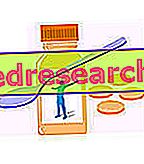Nausea is a symptomatic manifestation that is quite uncomfortable and sometimes disabling.
Marked by a more or less intense malaise, it is often accompanied by desire or the need to vomit.

Nausea can lead to vomiting. Nevertheless, the two symptoms are not necessarily related.
The causes of nausea can be of various types:
- Gastro intestinal.
- Cerebral and vestibular system (brain and inner ear).
- Metabolic (functional insufficiency of certain regulatory organs and diabetes).
- Tumor.
- Emotional and / or psychological (anxiety, panic, visual or olfactory stimuli, etc.).
- Infectious (gastro intestinal or systemic).
- Pharmacological (chemotherapy drugs, anesthetics, oral contraceptives and antibiotics).
- For food intolerances.
- For poisoning.
- For intoxication (from ethyl alcohol, THC, iron).
- Gravidarum.
In gastro intestinal conditions, nausea may depend on: gastrointestinal diseases, severe gastroesophageal reflux, hepatitis, swallowing of air, over-abundant meals, frugal feeding, etc.
The causes of nausea that primarily affect the central nervous system and the inner ear are: head trauma, cerebral haemorrhages, labyrinthitis, migraine and motion sickness (movement sickness, such as seasickness, etc.).
Among the various pathologies and metabolic conditions that can trigger nausea we mention: ketoacidosis (diabetic and non-diabetic), hypoglycemia, low blood pressure, liver failure (ammonium accumulation), renal insufficiency (excess or defect of various molecules and ions), advanced neoplasms, serious and / or widespread.
What to do
To reduce the sense of nausea it is first of all necessary to understand the root cause. Let's go into detail.
When it depends on problems with the digestive organs
- Undergo visits to understand which is the organ of origin and the discomfort that afflicts it. Very often they are involved: gastric hyperacidity, gastritis (or other serious pathological changes, even of the duodenum), hiatal hernia and gastroesophageal reflux, esophagitis (or other serious pathological changes) etc.
- The curative intervention is characterized by:
- Proper diet.
- Appropriate lifestyle.
- Nervous stress reduction.
- Dedicated medical care.
- Specific drugs for the disease in question.
- Post-prandial nausea (after eating) is caused by over-abundant meals, frugal feeding and swallowing air (almost always co-present); in these cases it becomes absolutely necessary:
- Reduce the total volume of food, portions and individual bites.
- Establish a chewing rhythm.
- Set a minimum time within which to consume food.
- The most suitable foods are those that are highly digestible and that do not over-engage the stomach.
In some cases, post-prandial nausea due to swallowing air is due to a disorder called dysphagia. In this case it is necessary to differentiate the diagnosis (to identify the type of dysphagia) and follow the appropriate dedicated guidelines.
Postprandial nausea can also occur following loss of control over food (compulsive feeding). This happens in some eating disorders such as bulimia nervosa and the Binge Eating Disorder. It has nothing to do with self-induced vomiting.
When Nausea Depends on Other Causes
- When nausea occurs after a head injury or cerebral hemorrhage, medical priority affects the treatment of nerve injuries. The symptom vanishes with the resolution of the problem.
- Migraine nausea is difficult to treat. The priority should be to treat headaches; nevertheless, this disorder does not always respond effectively to therapies. Sometimes it is necessary to adopt a drug therapy against nausea while waiting for the migraine to vanish.
- Motion sickness and labyrinthitis are responsible for dizziness that can trigger both nausea and vomiting. In the case of labyrinthitis it is sufficient that the subject remains motionless in bed; the body independently takes care of the recovery. For the motion sickness instead, it is possible to adopt some useful devices; these are not able to cure the disorder but help to control the nausea:
- Avoid taking drinks or liquid foods.
- Prefer dry foods.
- Try to focus on the road, the horizon or a stationary object.
- Anticipate the movements of the means of transport or drive it etc.
- Hepatic and renal insufficiency are characterized by a reduction in organ function. The liver and compromised kidneys, not being able to perform their metabolic functions properly, are responsible for very serious metabolic disorders that favor the onset of nausea. The medical goal is to compensate for the functional deficit by restoring homeostasis. This determines the remission of nausea and all other related complications.
- Ketoacidosis (excess ketone bodies) and hypoglycemia (blood glucose deficiency) can trigger nausea. Both can occur in physiological conditions (due to a carbohydrate-free diet and excessive motor activity) or pathological (diabetes mellitus). To reduce related nausea, it is necessary to maintain normal blood levels of glucose and insulin (a hormone deficient in type 1 diabetics).
- Low blood pressure (hypotension) can cause dizziness and nausea. In this case, it may be useful:
- Reduce the ambient temperature.
- Increase the intake of liquids, minerals and glucose.
- In the case of severe or widespread malignancies, nausea is treated pharmacologically.
- Nausea from poisoning, poisoning and food intolerances requires the exclusion / elimination of poisonous principles from diet, from the atmosphere or from the organism (vomiting, gastric lavage, bowel practices, etc.).
- Infections that can cause nausea mainly affect the gastro-intestinal tract. Characterized by the ingestion of bacteria and / or their toxins, food poisoning can also cause vomiting and diarrhea. In other cases, nausea is associated with systemic viral infections. It is necessary to wait for the organism to eliminate the pathogen or adopt medical practices to speed up the process (drugs).
- Nausea of pharmacological origin can be combated:
- Excluding the responsible drug.
- Replacing it.
- Compensating for discomfort by taking other specific medications against nausea.
- Nausea of emotional origin can be fought with:
- Mental training systems.
- Psychotherapy.
- With the help of anxiolytic drugs.
- Pregnancy is a special physiological condition that almost always leads to the onset of mild or more intense nausea (especially in the first 12 weeks). Often accompanied by vomiting, this discomfort can be combated similarly to motion sickness.
What NOT to do
- Agitation, frenzy and anxious states. An "alerted" nervous system is also super-stimulated. This increases any type of psychosomatic function, including nausea. It is absolutely not recommended:
- Move too much (work, play sports, heavy housework, etc.).
- Engage intellectually.
- Engage yourself emotionally.
- Stay in closed, crowded and noisy places for a long time.
- Prone body position and slightly declined head position. In the case of nausea, the most correct position is one in which one feels at ease but is rarely prone (belly down) or with a declined head (lower than the torso and legs). The universally best tolerated position is the supine position.
NB . In case of unconsciousness it is necessary to put the body on its side to prevent suffocation in case of vomiting.
- Exposure to high temperatures. The perception of heat tends to make nausea worse. Also for this reason, it is sometimes recommended to apply a wet cloth on the forehead.
- Drink large quantities of water, drinks or liquid food. The fluid tends to "toss" in the stomach, worsening the feeling of nausea. It is advisable to drink frequently and in small sips.
- Eat large amounts of food, quickly, chewing little, preferring foods that are not easily digested. As we have already specified these behaviors can worsen or even cause nausea.
- Fast. Fasting should be avoided, as it promotes certain negative reactions such as hypoglycemia, hypotension and a feeling of gastric emptiness. It is aggravated by intense physical activity.
- Take medicines that are potentially responsible or that may aggravate nausea. It is advisable to abolish: contraceptives and (if possible) painkillers. According to the doctor, it could be useful to try to replace the drugs in use that could be responsible for the symptom.
- Expose yourself to smog or toxic fumes. The inhalation of combustion products is harmful to the central nervous system. In case of nausea, hypersensitivity to any unwanted molecule occurs. It is advisable to avoid potentially contaminated places such as mechanical workshops, kitchens in operation, ovens, city traffic, etc.
- Smoking, using drugs (even reading) and drinking alcohol. They are all habits that lead to an increase in the blood concentration of principles favoring nausea.
- Reduce sleep hours. The brain needs to recharge periodically and systematically. This does not happen simply by resting but it is essential to sleep. When the brain does not recharge sufficiently, nausea may appear or worsen.
- Movements with means of transport guided by other people. It is advisable to travel as little as possible and especially when it is not possible to drive the vehicle.
What to eat
- Tendentially dry (non-liquid) foods capable of absorbing gastric juices.
- Foods that are easily digestible, preferably rich in carbohydrates, low in fat, not too high in protein and cooked in a suitable manner (not raw or not cooked).
- Functional foods.
The most suitable foods are: lean bread crust, rice, pasta, bananas, potatoes, carrots, hulled legumes, biscuits, wasa bread, unsalted lean crackers etc.
The preferred cooking methods are: drowning (boiling in water), steaming and in a pressure cooker. The heat treatment in the pan (on a moderate flame) and in foil in the oven are also allowed.
Among the functional foods that can reduce nausea we recall: ginger, licorice root, coca-cola (the reason is not clear, but it seems to reduce the feeling of nausea) and ginger ale (it is a ginger drink).
Some suggest the use of mint, although it is part of the foods not recommended for gastro esophageal reflux.
What NOT to Eat
Foods not recommended for nausea are all those that do not comply with the requirements mentioned in the previous paragraph, therefore:
- Foods that are too liquid or oily
- Foods that are difficult to digest, rich in fats and proteins, raw or cooked long.
- Irritating and / or harmful foods.
The less indicated foods are: fat meat broth, whole milk, cold cuts, fat cheeses, fatty and / or stewed or fried meats, more than two eggs at a time (especially in omelette), fried vegetables, creamy or fat desserts, snacks, too salty foods, rich in chilli and pepper, chocolate, mint, coffee and alcoholic beverages.
Natural Cures and Remedies
- Dry ginger extract (up to 1 gram per day)
- Liquid extract of salicaria, holy thistle, elderberry and nettle; two teaspoons diluted in a little water 3 times a day.
- Infusion 1: minor centaurea, chamomile, mallow and mint.
- Infusion 2: juniper, plantain, borage, elm and polypody.
- Infusion 3: aromatic calamus, fibrino clover, enula, linden flowers, chamomile.
Pharmacological care
- In pregnancies characterized by very intense and prolonged nausea, the doctor may choose to administer: promethazine, metoclopramide and prochlorperazine. See: Medications for nausea in pregnancy
- For post-surgical nausea, metoclopramide, prochlorperazine, cyclizine and dexamethasone are most indicated.
- In case of evolution into vomit, depending on the triggering cause, other molecules belonging to the groups are recommended: anticholinergic-antispatic, stimulating the motility of the stomach, dopamin antagonists, antihistamines and antipsychotics.
Prevention
- Specific for diseases or conditions that can cause nausea (including complications).
- Avoid eating quickly or excessively.
- Avoid alcohol, other nerves and drugs.
- Share the diet in 5 meals a day, choosing the appropriate foods and excluding the least tolerated.
- Ensure optimal nutritional status.
- In case of motion sickness, take the drug before traveling.
- Practice mental training or advanced relaxation techniques.
- Get enough sleep.
- Avoid awkward situations (mental stress, disgusting situations, etc.) and, if necessary, use anxiolytics.
- Avoid exposure to contaminants, pollutants or odors that can trigger nausea.
Medical treatments
Medical treatments to treat nausea are limited to pharmacological use.
Indirectly, this symptom improves thanks to healing therapies for the primary disorder, which may also be surgical or otherwise.
In addition to the pharmacological one, there are no other truly effective methods to improve nausea as a symptom.
Mental / psychological training is a very effective system but requires rather significant commitment and dedication.



